Alumni Network
MSc Programs Alumni
Alumni of the international MSc programs pursue diverse paths after completing their studies. The Hebrew University degree opens many doors to doctoral studies or securing employment in academics, research, government, NGOs, industry, medical facilities, and local and national organizations.
The International School is dedicated to maintaining contact with alumni through various avenues of communication: periodic newsletters, the HU Pears Alumni Network members-only Facebook group, international alumni conferences and webinars, seed grants awarded to alumni for projects in their local communities, and local chapter meetings.

Pears Seed Grants
Pears Seed-Grant Program to Promote Agricultural & Nutrition Projects
As an academic institution, we encourage our alumni to engage in research activities. Some of you may already be engaged in research projects that are funded by national or international funding agencies. Others may be interested in initiating studies but require initial funding. With the generous funding support of the Pears Foundation we are establishing a seed-money granting mechanism for preliminary development of research/community projects.
The goal of this proposed Pears Seed-Grant Program is to stimulate scholarly initiative by encouraging alumni to explore new directions in agricultural and nutrition related subjects, practice-related research or training-related research. This research should contribute to the development and/or evaluation of programs aimed at addressing challenges on an academic, national or local level, and will hopefully generate findings that could serve as the basis for submission of funding proposals to external funding agencies. Collaboration among program alumni is encouraged.
All Alumni of the MSc programs are invited to submit proposals for new research/community projects (of 12-18 months duration). Proposals will be subject to competitive review by a committee that will rank the proposals on anticipated contribution to the community and feasibility.
Alumni whose proposals are evaluated favorably will be awarded a grant in the amount of up to US$5,000.
Proposal Submission Guidelines
The proposal should not exceed 5 double-spaced A4 pages (12 font text), and must include the following sections:
· Background and "case for action"
· Clear and specific study objectives and future sustainability
· Operational background
· Anticipated contribution of the findings/project to the challenges of your community
· List collaborators or collaborating institutions/organizations
· Estimated timeline
· Budget including rationale
· Curriculum vitae of individuals or profiles of organizations involved in the project
Proposal submission deadline: January 01, 2023
Notification of Seed-Grant award: March 01, 2023
For additional information and proposal email submissions:
Noa Schwarzwald
Alumni Seed Projects
Agriculture and Nutrition Project at Sandleni Community, Swaziland
Siyabonga Kwanele Simelane, Swaziland
MSc in Nutrition Class of 2013-14
PROMOTING AGRICULTURE AND NUTRITION PROJECT AT SANDLENI COMMUNITY, SWAZILAND
An amazing and inspiring project of one of our Alumni. The project's main goal is to improve the nutrition and health status of the Sandleni Community for all vulnerable groups, especially orphans and vulnerable children (OVC) by providing effective, comprehensive, decentralized, coordinated, sustainable and enabling environment for the provision of food and nutrition services.
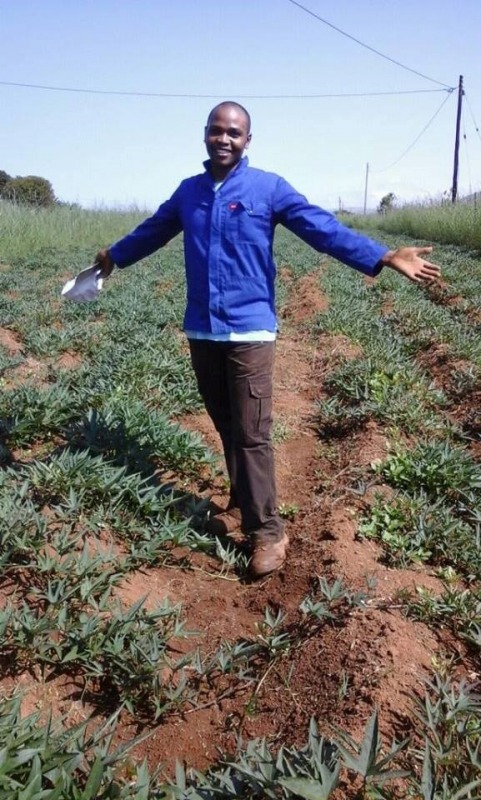

ANTICIPATED CONTRIBUTION OF THE FINDINGS/PROJECT TO THE CHALLENGES OF MY COMMUNITY
To reduce morbidity and mortality due to nutrition related conditions. Chronic malnutrition will be alleviated among children because there will be enough food for everyone including pregnant women. The livelihood of the community members will be improved because they will be able to produce food enough to feed their families and also sell the surplus to finance other bills. Employment opportunities will also be improved. This will be a contribution towards a well fed society, resulting to less malnutrition and stress related health problem, in turn improving the country’s life expectancy.
COLLABORATING ORGANIZATIONS
|
ORGANIZATION |
ACTIVITIES |
|
Swaziland Infant Nutrition Action Network |
A non-governmental organization mandated to carry out the national infant and young children feeding issues. |
|
World Food Programme |
Technical and financial support in the Nutrition and HIV programme. |
|
World Health Organization |
Technical and financial support in nutrition programmes. |
|
Swaziland Government (Ministry of Agriculture) |
Technical support on best practises in agriculture for the production of high quality yield. Facilitate food security by subsidizing costs of farm inputs to farmers engaged in commercial mixed farming. |
Meet our Alumni
,
Monica Garcia-Teruel, Mexico, MSc Plant Sciences 2012
Hello,
I was in the program MSc in Plant Sciences (Horticulture) 2010-2012. I currently live in Mexico City, and I started my business 2 years ago, called VERDE AIRE, it is a small hydroponic greenhouse where I grow lettuce and other greens, mostly local produce, and also ecologically. We started selling to supermarkets and in very small scale to restaurants.
I also work at a rural development start-up: ESOKO, as agricultural content creator. And lastly I just started last week, teaching one course at the Bachelor of Sustainable Development, called Climate Change.
2 things that I really wanted are true: work in rural development and starting a project.
Cheers!
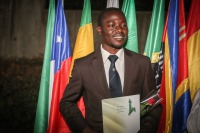
Simon Ekwaro, Uganda, MSc Plant Sciences 2014
Am really more than happy to write to you and above all inform you about the achievements and progress that I have made at the moment. When I made my decision to leave the Faculty last year to come back home (Uganda) to cater for my sick and old parents in the village, I had two things in mind which I even wrote in my letter of appreciation to the sponsors;
- To startup an Agro input business centre where I sell all kinds of Agro inputs to the farming communities in my area.
- To start the process of establishing a farm which will be used as a centre for providing training to Youths, small and medium scale farmer, Agricultural colleges Universities and other willing bodies
Am happy to inform you that I managed to set up the Agro input centre though it has also some challenges in management which am trying to address with my colleagues.
I also acquired Land with my colleague in an area which is strategically located to provide the service since it is located between two different towns in the Northern part of the country.
We also managed to establish a piggery unit and set up several demonstrations gardens and also started conducted some training in agronomy of vegetables mainly Tomatoes and Cabbages.
At the moment, we are planning to establish small green houses for tomatoes, and other vegetables to fully provide practical, modern and new technologies to the farmers, youths and other interested persons as stated above.
What we also deal with is engaging the youth who don't take farming seriously to see that there is value in farming. We also want to see that the youth are actively involved into Agriculture sector in Uganda by being exemplary.
MASHAV Alumni
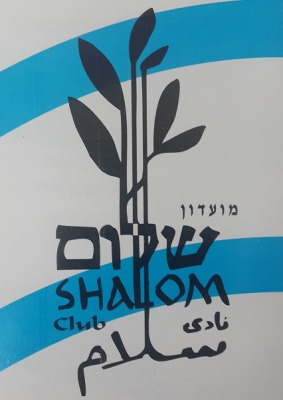
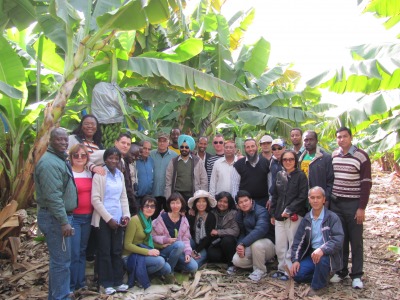
All MASHAV alumni are invited to join the Shalom Clubs around the world.
The Shalom Clubs serve as a forum for MASHAV alumni to participate in professional and social activities. Members are invited to attend local lectures by skilled experts, to exchange ideas, organize technical cooperation and humanitarian assistance, and hold cultural functions.
Among the many activities that have been organized by Shalom Club members in their home countries are workshops on professional topics ranging from AI
MASHAV alumni should contact their local Israeli embassy when back in their home countries to seek the contact details of their Shalom Club coordinator. DS education to business management, organization of events to raise funds for local charities, and mobilization of club members to donate their professional services for community development and humanitarian activities. Members of the Shalom Clubs play an integral role in determining the focus and scope of programming of their clubs.
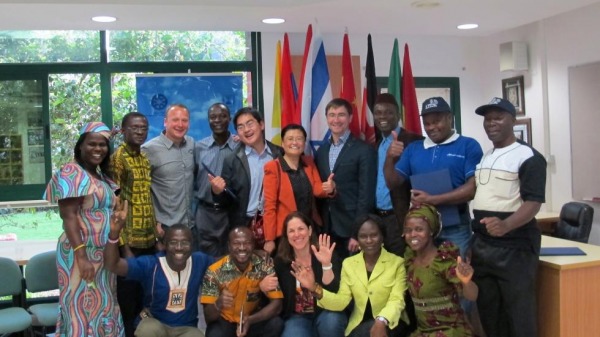
Pears Alumni Webinars and Symposiums
The 2nd Pears Alumni Symposium in Plant Sciences: Knowledge Sharing - A Key for Enhancing Agricultural Productivity - September 2015
Sustaining food production for the rapidly increasing world population under diminishing resources is a major challenge facing global agriculture. While certain countries, such as Israel, managed to adopt modern agro-technologies and considerably increase their crop production over the last half a century, other countries are still lagging behind in this respect. Closing this gap by promoting agricultural practices in least-developed countries is among the most promising strategies to enhance crop production and food security where it is most needed.
The 1st Pears Alumni Webinar in Nutritional Sciences - September 2014
View on YouTube (6 videos)
The Pears Foundation Webinar is an annual, two-day interactive presentation of current scientific topics and lectures aimed at students and alumni.
In 2014 the focus was on Nutritional Sciences. Thirteen graduates presented the research exercises they conducted over the year. The keynote speaker was Prof. Elliot M. Berry of the School of Public Health, Hebrew University of Jerusalem. The Pears Alumni Guest Lecturer was Mr. Lovemore Nkhata Malunga of Malawi.
View on YouTube (6 videos)
For more information on past webinars, visit:
The Ist Pears Foundation Webinar in Nutritional Sciences
Pears Alumni Network Big Brother Program
The "Big Brother Program" is a mentoring program in which senior alumni voluntarily provide assistance to new alumni after they graduate and return home.
You are welcome to email your questions to any of the alumni below.
Ethiopia
-
Name: Tenagne Delessa Challa
Program: Nutritional Sciences
Year: 2007/2008
Occupation:I am a PhD student at Swiss Federal Institute of Technology (ETH Zurich) at the Department of Health Sciences and Technology (D-HEST) and Institute of Food, Nutrition and Health (IFNH), (PhD program Molecular Life Sciences).
My research project is focus on the identification and investigation of novel adipose tissue secretomes which might regulate adipogenesis.
Findings from this study would provide us the basis for understanding the molecular mechanisms that underlie adipogenic process and open new road for therapeutic approaches to counteract the epidemic of obesity and type II diabetes.
Email: tenagnetd@yahoo.com
-
Name: Endale Geta Tafesse
Program: Plant Sciences
Year: 2006/2007
Occupation:
Email: endalegeta@gmail.com
-
Name: Tesfay Araya
Program: Plant Sciences
Year: 2002/2003
Occupation:I currently work at Mekelle University, Ethiopia.
I completed my PhD study in Applied Biological Science.
My research interest is on conservation agriculture.Email: tesfayw2002@yahoo.com
Ghana
-
Name: Juliet Serwaa Asamoah
Program: Plant Sciences
Year: 2008/2009
Occupation:
Email: jullyasamoah@yahoo.com
Kenya
-
Name: Roselyne Makau
Program: Nutritional Sciences
Year: 2007/2008
Occupation:I work at the Kenya Bureau of Standards as a Food Safety Certification Officer, a position I have held for the last seven years.Email: rozmakau@yahoo.com
Mexico
- Name: Victoria Eugenia Ramos
Program: Nutritional Sciences
Year: 2005/2006
Occupation:Chief of the Clinical Nutrition Division, Federal General Hospital Gea, México.
Coordinator of the Obesity and Bariatric Surgery Clinic, Federal General Hospital Gea, México.Email: victoriaeugenia.ramos@gmail.com
Uganda
- Name: Peace Nakitto
Program: Nutritional Sciences
Year: 2009/2010
Occupation:I work as a Program Officer-Nutrition with Elizabeth Glazer Pediatric AIDS Foundation (EGPAF)-Uganda.Email: nakitto.peace@gmail.com